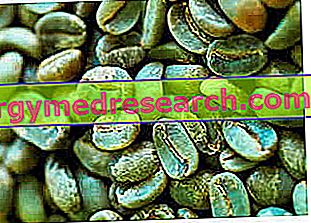Introduction
Despite the roasted black coffee, some food professionals claim that the raw green coffee drink can also be consumed by subjects with mild gastric mucosa disorders.

Benefits of Green Coffee
Why consume raw green coffee?
From the raw green coffee, after infusion of the powder obtained by grinding the seeds of Coffea (Arabica or Robusta), a greenish-yellowish, limpid and sober (not black like the traditional) drink is obtained, with a delicate and almost imperceptible aroma, but nevertheless endowed with stimulating power. As many readers have already guessed, this last peculiarity is determined by the presence of 1, 3, 7-trimethylxanthine (more commonly known as CAFFEINE ) and obviously also of the relative "molecular variants".
Without going into the subject (which is already widely described in other dedicated articles), we remind you that caffeine has two main positive effects on the mobilization of fat from adipose tissue: the first is direct, so caffeine can also "stimulate" from only "lipolysis; the second is instead indirect, since promoting the release of catecholamines further promotes the mobilization of fat stocks (it goes without saying that, even if it is poured into the blood, if these lipids are not used for energy, they would again cram fat cells) .
Therefore, thanks to its methylxanthine content, raw green coffee has already been placed among the natural remedies useful for the weight loss of excess fat mass; without turning around too much, some say that raw green coffee (similar to traditional roasted coffee and thermogenic supplements / energy drinks), if contextualised in a slimming diet (therefore low-calorie and balanced), can represent a valid complement to therapy against overweight and obesity. However, unlike the other products mentioned, raw green coffee has an absolutely unique characteristic: it stands out for the reduced speed of absorption of the stimulant (since trimethylxanthine is in the form linked to chlorogenic acid forming the chlorogenate); this is reflected in a slowing of the pharmacokinetics and in an increase in its stay in the circulation (called half-life and regulated by hepatic metabolism as well as by renal filtration) .
Moreover, among the various chemical characteristics of raw green coffee (and differently from roasted black coffee), there is a significant content of antioxidant molecules (polyphenols, ferulic acid, chlorogenic acid), minerals and water-soluble vitamins; not by chance is also a phytocomplex product.
At this point a question arises; why should raw green coffee be more recommended than black roasted coffee in case of gastritis or similar symptoms?
Effects on the Stomach
Differences compared to roasted black coffee
In fact, raw green coffee interacts with the organism in a quite different way than the black roasted one ... even if, you allow me the observation, we are still dealing with the topic in an empirical way, while in the nutritional field what often make the difference is the PORTION, then the DOSE of the active ingredient. However, below we will try to dissect the most important aspects that could differentiate the effects of raw green coffee on the gastric mucosa compared to the black roasted one:
- pH : firstly, the pH of raw green coffee (5) is absolutely less aggressive and closer to neutral than that of roasted black coffee, which has a tendentially acid pH (3-3.5); this difference is quite important since, in most cases of gastritis or heartburn, the defensive barrier established by the mucosa is not sufficient to protect the epithelium from strongly acidic digestive juices and sometimes (abnormally) also secreted to empty stomach. From this point of view, raw green coffee is certainly less harmful than black roasted coffee, but not yet recommended.
- Amount of caffeine : raw green coffee contains less caffeine free than black roasted coffee; this difference is mainly due to the lack of heat treatment of the seeds (roasting that breaks down the chlorogenate and favors the dilution of methylxanthine) and probably from the infusion temperature of the powder which, while in black coffee is always very high, for raw green coffee NOT it must never exceed 80 ° C. More and more concentrated amounts of caffeine amplify the relative effects on the gastric mucosa, in particular:
- The increase in acid secretion (which, as we have already seen, negatively affects the irritation of the mucosa and the appearance of symptoms)
- Increased contraction of gastric smooth muscle (which is likely to anticipate and emphasize heartburn).
Also in this respect, raw green coffee would seem to promote less gastritis than black roasted coffee.
- Speed of absorption of caffeine : for the reasons described above, raw green coffee determines a slower absorption of caffeine which "probably" triggers acid secretion and peristalsis of the bag less strongly. Once again, raw green coffee would seem less harmful than black roasted gastritis.
- Roasting failure : the heat treatment (cooking at 200-240 ° C), to which the seeds are subjected to obtain the roasted black coffee, determines the caramelisation of the sugars (hence the dark color) and the formation of the so-called caffeone; it is a voltatile oil composed of a mixture of terpenic compounds, which gives the characteristic aroma to coffee and at the same time irritates the mucous membranes of the stomach, stimulating the production of gastric juice; this feature facilitates digestion in a healthy individual, but increases the problems during gastritis. The presence of caffeone is highlighted by the shiny and oily veil appreciable on the surface of the seeds of roasted black coffee. Not being subjected to roasting, green coffee is free of caffeine, and as such is less irritating to the mucous membranes of the stomach.
In conclusion, having to choose between one and the other product, in order to "avoid" the onset of gastric symptoms (heartburn) or, worse still, gastritis, it would be preferable to focus on raw green coffee; however, in the presence of symptoms or a pre-existing clinical diagnosis of gastritis, raw green coffee is also one of the most inadvisable drinks to avoid in food therapy aimed at reducing heartburn or restoring the integrity of the gastric mucosa.



